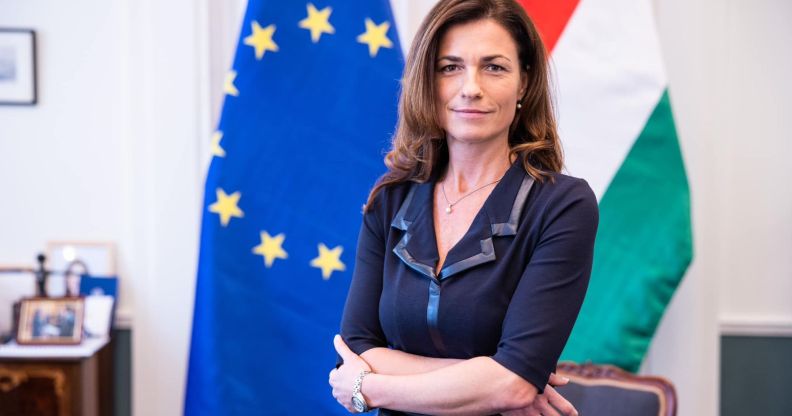Hungary vows to defend its cruel anti-LGBTQ+ law after EU legal challenge: ‘We will not surrender’

Hungary’s Justice Minister, Judit Varga, has filed a counterclaim in the EU Court of Justice to defend the country’s anti-LGBTQ+ law. (Facebook)
Hungary plans to fight the Court of Justice of the European Union to defend its controversial anti-LGBTQ+ law.
The country’s Child Protection Act, which was passed with just one dissenting vote in June 2021, bans the discussion of LGBTQ+ people in schools and in the media.
The European Commission launched legal action by referring Hungary to the court in July 2022, saying the law “discriminates against people on the basis of their sexual orientation and gender identity”.
At the time, the commission said the law “singles out and targets content that ‘promotes or portrays’ what it refers to as ‘divergence from self-identity corresponding to sex at birth, sex change or homosexuality’ for individuals under 18”.
In a Facebook post on Wednesday (8 March), Hungary’s justice minister, Judit Varga, said she had filed a counter claim with the court.
“Hungary will not surrender,” she said. “We continue to stand by our conviction and the Charter of Fundamental Rights of the European Union that education is a national competence and that parents have the right to decide on the upbringing of their children.“
Varga claimed that there had been “cases that have come to light in recent weeks” that “clearly” showed the need for a child protection law “as well as further measures”.
The Hungarian government has previously said the law is to protect children, not target the LGBTQ+ community.
In a speech last month, as reported by Reuters, prime minister Viktor Orbán defended the legislation, saying “gender propaganda is not just … rainbow chatter, but the greatest threat stalking our children”.
He went on: “We want our children to be left alone… this kind of thing has no place in Hungary, and especially not in our schools.”
Almost universal condemnation of Hungary’s anti-LGBTQ+ law
While the European Commission is taking legal action, others have also come out strongly against the legislation.
Not long after the law was passed, Dutch prime minister Mark Rutte said Hungary should be expelled from the EU if it didn’t back down.
Around the same time, Rutte, along with the leaders of 16 other EU countries, signed a letter that said the leaders would “continue fighting against discrimination towards the LGBT+ community”.
While the letter did not explicitly name Hungary, it was written “in the light of threats against fundamental rights and in particular the principle of non-discrimination on grounds of sexual orientation”.
In December 2021, the Venice Commission, which advises the Council of Europe, a human rights group, on constitutional law matters, decreed that the law contributed to a “threatening environment” for LGBT+ children and “leaves space only for one-sided and biases teaching, opening doors to stigmatisation and discrimination of LGBTQI people”.
The Venice Commission also said the law’s broad application and ambiguity meant it could violate other human rights.
How did this story make you feel?

